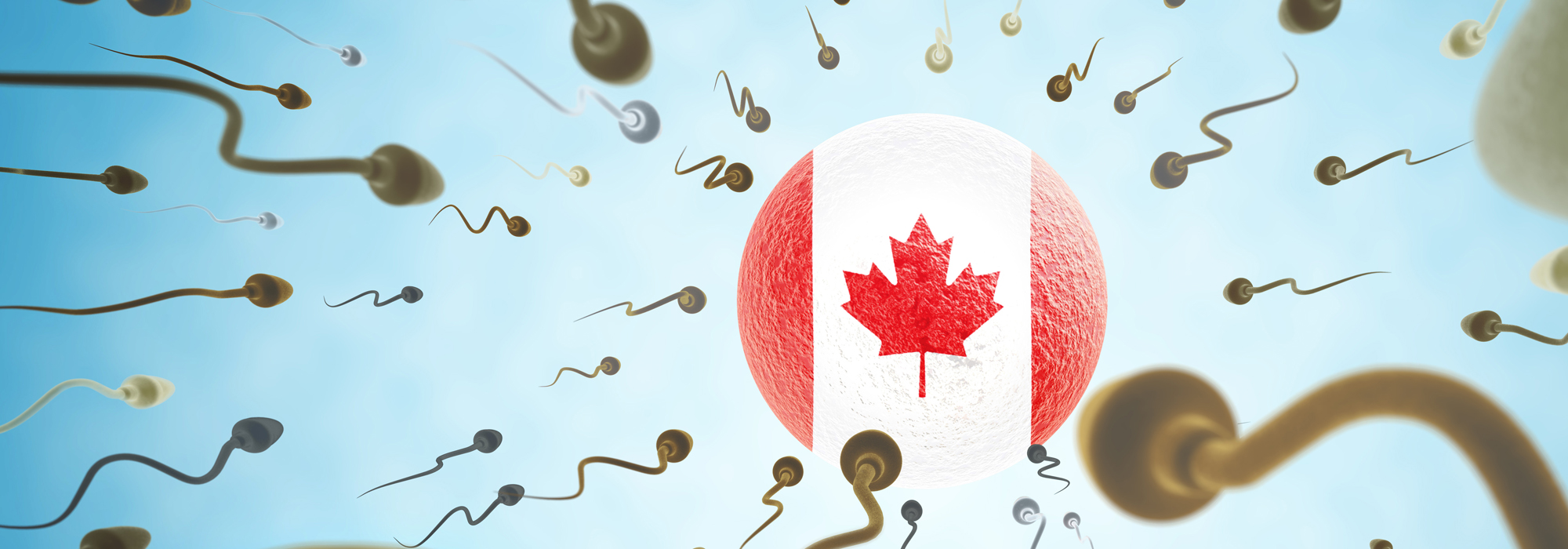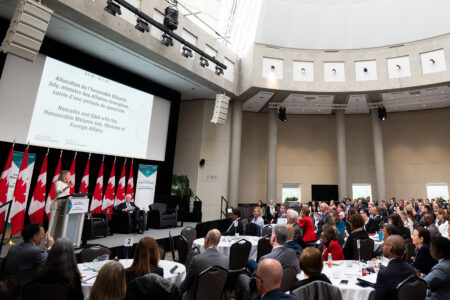
In a 2015 article I asked: “does sperm have a flag?” The answer is, as it turns out, yes. And in the context of Canadian citizenship, it seems likely that eggs and wombs have flags too – although we can’t yet be entirely sure. But one thing is clear: a genetic/biological relationship plays a critical role in citizenship – even in this contemporary era of reproductive technologies and diverse practices of family formation.
Canada’s Citizenship Act enables people born abroad to a Canadian-born citizen parent to be Canadians. But who is a parent? Traditionally, marriage turned husbands into (presumptive) fathers and mothers were women who gave birth. All Canadian provinces (which have jurisdictional authority for domestic parentage determination) maintain this definition, and they also include provisions for cohabiting different-sex partners. Some provinces have gone further, including specific provisions for same-sex partners, and incorporating provisions to name parents in situations involving assisted conception and surrogate mothers.
In all provincial statutes that address parentage and reproductive technologies, donors are not automatically considered parents, despite their genetic relationship to the child. Surrogate mothers are considered mothers until they waive their rights. In British Columbia, it is possible for three people to be named parents to a child, and in Ontario, up to four people can be named parents – but both provinces require a preconception agreement among the parties for these parentage designations to apply.
The provinces are not the only jurisdictions that are required to define who are parents. Given that citizenship status is a federal jurisdiction, and that the vast majority of Canadians become citizens on the basic criteria of birth, one might imagine that parentage would receive some attention in the federal Citizenship Act. While the word “parent” appears 95 times in the English text of the Act, it is never defined. As far as how children are understood, the Act tells us that a “child includes a child adopted or legitimized in accordance with the laws of the place where the adoption or legitimation took place.”
So, what should be done about children born abroad with the assistance of reproductive technologies?
Since the Citizenship Act is imprecise on exactly who constitutes a parent, the courts have necessarily been compelled to offer clarification. With regard to reproductive technologies, the case of record on this matter is Canada (Citizenship and Immigration) v. Kandola 2014 – heard by the Federal Court of Appeal. There, the court determined that a genetic relationship with a Canadian parent was required for a child born abroad to acquire Canadian citizenship.
The case involved the denial of Canadian citizenship to a child born in India to a Canadian father married to an Indian mother. The couple was forthright with citizenship officials regarding their use of reproductive technologies in the conception of their child and the fact that neither parent was genetically related to their daughter, even though her mother had given birth to her. In the lower court decision, the judge had ruled that the child was indeed a Canadian because she was born to married parents – she was “legitimized…in accordance with the laws of the place where the legitimation took place.”
In the Federal Court of Appeal, however, the court held that the absence of a genetic tie to her Canadian parent meant that the child was not a Canadian. The fact that her parents were married when she was born – and thus, that her birth was legitimate – did not suffice, since to be legitimized, as the Citizenship Act states, requires a prior state of illegitimacy.
The justices also examined the meaning of the word parent. Finding that the term was unhelpfully ambiguous in English, they sought clarity in the French text of the Act. In their reading, in order to be born of a father (né d’un père) or a mother (né d’une mère), a child would have to be genetically related to her Canadian parent. And while the Kandola case did not concern a Canadian citizen mother, the justices opined that both genetic and gestational motherhood would be required in order to confer Canadian citizenship from mother to child.
One might appreciate the clarity of genetic relationship as a means for determining citizenship for children born abroad. Unfortunately, though, genetic relationship is not an especially reliable indicator of a parental social identity or commitment. Indeed, one can envision the possible, lucrative opportunities for Canadian men abroad that such a genetic definition of citizenship would confer. But more seriously, as the availability of reproductive technologies increases and the domestic definition of parentage and families expands, this narrow cleaving to genetics – to Canadian blood – fails to reflect the realities of Canadians’ lives and practices of family formation. We can do better.
Taking the lead from provinces that already have provisions for parentage determination in situations involving reproductive technologies, a revised Citizenship Act (or regulations) could require that Canadian parents register their intent to seek out reproductive services and the possibility that their child could be born abroad.
Parents could be required to provide supporting evidence from health care providers; and the Canadian regulations might limit recognition to certified providers, clinics or hospitals. Such provisions would apply to people normally resident in Canada who seek out foreign reproductive health services, and would address a broader social interest in the health and well-being of Canadian-citizen parents and children, as well as international human rights obligations to protect women from exploitation. For Canadians who are resident abroad and thus less likely to be aware of Canadian legal developments around parentage, the Act could rely on the parentage provisions of the country of residence – as it currently does for the definition of a child.
In the context of Canadian citizenship and foreign adoptions, Canadian law underscores the importance of a genuine parent-child relationship. By contrast, the citizenship of children born to Canadian parents requires only genetics. Surely people who pursue parentage through the use of reproductive technologies are sufficiently genuine in their intent to form a parent-child relationship that they, too, can confer citizenship on their children. It’s time for Canada’s Citizenship Act to catch up.
This article is part of the Addressing the Gaps in Canada’s Assisted Reproduction Policy special feature.
Photo: Shutterstock, by Per Bengtsson.
Do you have something to say about the article you just read? Be part of the Policy Options discussion, and send in your own submission. Here is a link on how to do it. | Souhaitez-vous réagir à cet article ? Joignez-vous aux débats d’Options politiques et soumettez-nous votre texte en suivant ces directives.








